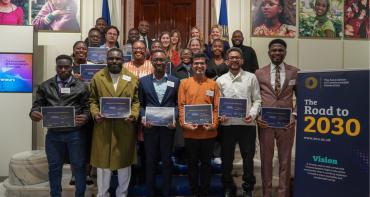The Commonwealth will help Ghana develop a new evidence-based national youth policy. The initiative will empower the country’s youth population to reach its full potential and contribute meaningfully to national development.

The Commonwealth will help Ghana develop a new evidence-based national youth policy. The initiative will empower the country’s youth population to reach its full potential and contribute meaningfully to national development.
The Minister for Youth and Sport, Isaac Asiamah, launched the project in Accra and thanked the Commonwealth for its support.
The Minister said: “The current Ghana national youth policy, which was enacted in 2010, requires updating in order to make it more responsive to the contemporary needs and aspirations of youth. It needs to take into account the 2030 Sustainable Development Goals, changes in the socio-economic landscape of the country and recent developments at the international level.”
The Minister stressed that the development of a new policy “will enhance the status of young people and empower them to build on their competencies and capabilities for life”.
The Commonwealth’s youth division will review Ghana’s current youth policy in view of topical development issues affecting young people such as inequality and unemployment.
In addition, the youth division will conduct a detailed review of country’s institutional frameworks and will consult with relevant stakeholders. The findings of this analysis will help experts identify the priorities for the new policy. The youth division will then assist the country to formulate an inclusive and evidence-based policy which will have predefined goals, targets, outcomes and actions, and the means to track progress.
Sushil Ram, a programme manager at Commonwealth’s youth division, said: “The project will create a strategic environment that enables the Ghana National Youth Authority and the Ministry of Youth and Sports to effectively address youth development priorities and to mainstream youth policy across the entire spectrum of the government’s policies and programmes.”



